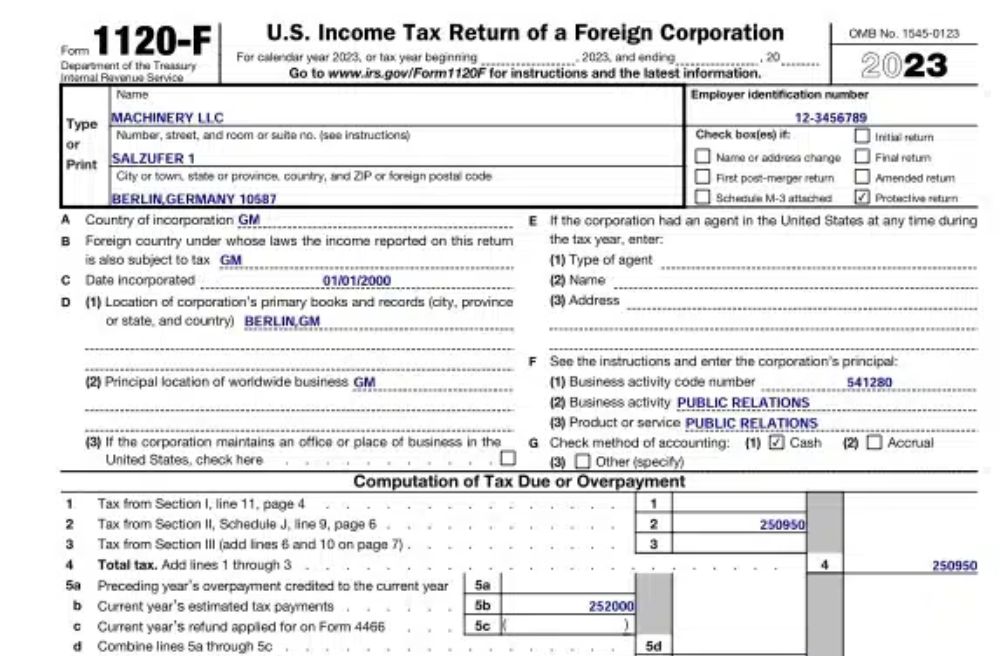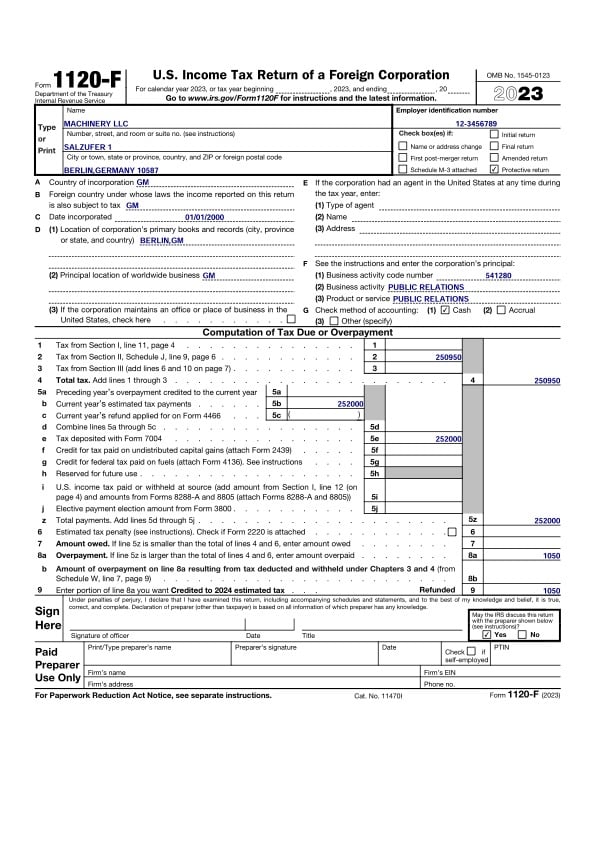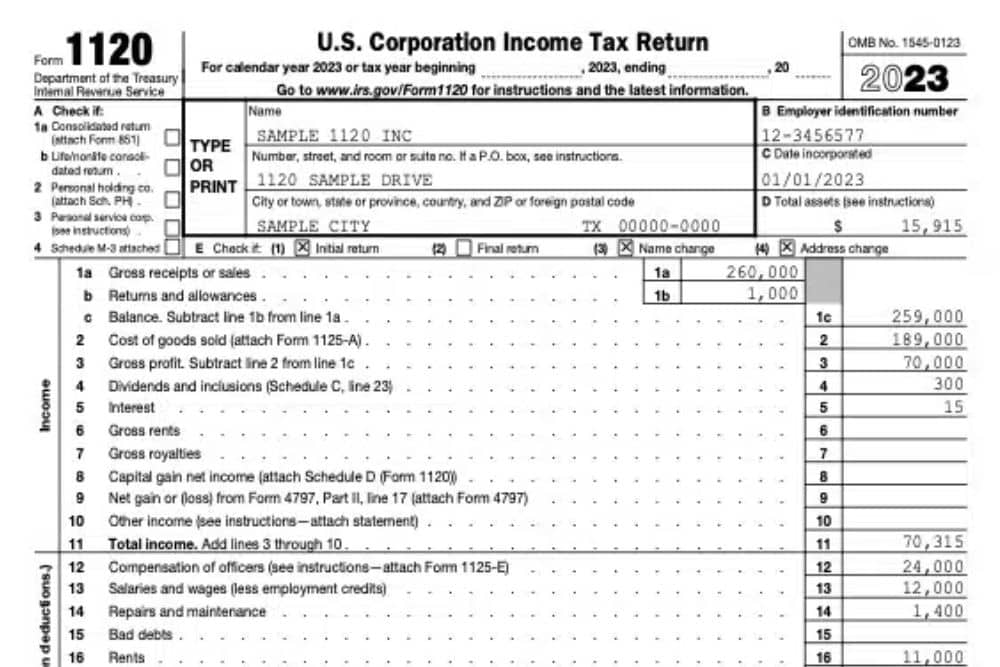Form 1120-F: What Expat Business Owners Need to Know

If your foreign corporation does business in the US, you may be required to file IRS Form 1120-F. The form is used to report income, expenses, deductions, and credits of a US trade or business. In this guide, you’ll learn what Form 1120-F is and who has to file it.
Key Takeaways
- Form 1120-F is a tax return used by certain foreign corporations who were engaged in business in the US, or have income from US sources to report their income from sources in the United States.
- Form 1120-F differs from Form 1120 in that it excludes interest, dividends and royalties derived outside of the US, as well as rent paid to unrelated parties outside of the US, while Form 1120 includes such items in taxable income on Line 11 of Part I.
- 1120-F is also filed by corporations seeking a refund of US taxes paid during the year.
What Is Form 1120-F?
Form 1120-F is the form certain foreign corporations must use to report their financial information to the IRS. This form serves as the foreign corporation’s income tax return in the US and includes an overview of the corporation’s income, gains, and losses. It also allows foreign corporations to claim any tax deductions and credits.
Dreading the last minute scramble pulling together your tax documents? Despair no more! This simple checklist lists the documents you need to have on hand when preparing to file.

The Difference between Form 1120 and Form 1120-F
Form 1120 is a tax form used by domestic corporations that are required to file income tax returns. It is also used by S corporations and partnerships that are required to file corporate returns. On the other hand, Form 1120-F is used by foreign corporations that have a US branch or office.
There are also a few different forms within the IRS 1120 series, each formatted for different entities.
- Form 1120 is the income tax return for domestic C corporations
- Form 1120-S is the income tax return for domestic S corporations
- Form 1120-C is the income tax return for domestic cooperative associations
- Form 1120-H is the income tax return for domestic homeowner associations
- Form 1120-F is the income tax return for certain foreign corporations
Who Has to File Form 1120-F?
Most foreign corporations will have to file Form 1120-F if they are engaged in business in the US or have “effectively connected” income with a US trade or business. In most cases, this means that a foreign corporation sells products or provides a service in the US. Alternatively, it may mean that the foreign corporation has some physical presence in the US, such as an employee, office, or warehouse.
For example, A German corporation selling machinery parts online to US companies would face different tax obligations based on their operations. Direct sales without a US presence don’t create Effectively Connected Income (ECI), avoiding ECI filing requirements. However, if sales are through a US office, or via a third-party like Amazon, filing a protective US tax return is prudent to preemptively address any potential reclassification of income as ECI by the IRS, allowing for future deductions and credits without penalties.
However, the concept of effectively connected income is incredibly complex. We recommend always consulting an expat tax specialist when determining whether you must file this form.
Even if you don’t have to file Form 1120-F, it may still be wise. This is known as protective filing, which safeguards the corporation’s rights to take deductions and credits against effectively connected income if the IRS later determines the income is taxable.
When Is Form 1120-F Due?
The deadline for Form 1120-F depends on whether your foreign corporation has a physical presence in the US.
- If you have an office, warehouse, or fixed place of business within the US, the deadline is April 15
- If you don’t have a physical presence in the US, the deadline is June 15
In either case, you can request a six-month extension to file by submitting IRS Form 7004.
An extension to file is not an extension to pay. If your foreign corporation will owe any taxes on your Form 1120-F tax return, you are still required to pay that debt by the original deadline.
What Is the Penalty for Failing to File Form 1120-F?
If you fail to file when required, you may face penalties. These penalties start at 5% of the unpaid tax per month, up to a maximum penalty of 25%.
How to File Form 1120-F
Form 1120-F is eight pages long and requests detailed information about your corporation’s income and financial standing. You will then use this information to calculate your US tax liability.
The IRS estimates that it will take taxpayers more than 70 hours to complete this form. This does not include the time needed to learn about the laws or gather the necessary documentation.
Because of this form’s complexity and time-consuming nature, it’s always best to enlist the help of a qualified tax professional.
For more details, see the Form 1120-F instructions provided by the IRS.

Can I E-file Form 1120-F?
Yes, most foreign corporations can file Form 1120-F electronically, as well as any related forms, schedules, and attachments. In some cases, e-filing may even be mandatory.
For example, corporations whose total assets are valued at least $10 million and who file at least 250 returns per year are typically required to e-file this form. (You can request a waiver for this requirement in some instances.)
Filing Form 1120-F Doesn’t Need to Be Complicated
We hope this guide has given you a better understanding of what Form 1120-F is and how it works. If you still have questions, Contact us, and one of our customer champions will be happy to help. If you need very specific advice on your specific tax situation, you can also click below to get a consultation with one of our expat tax experts.




